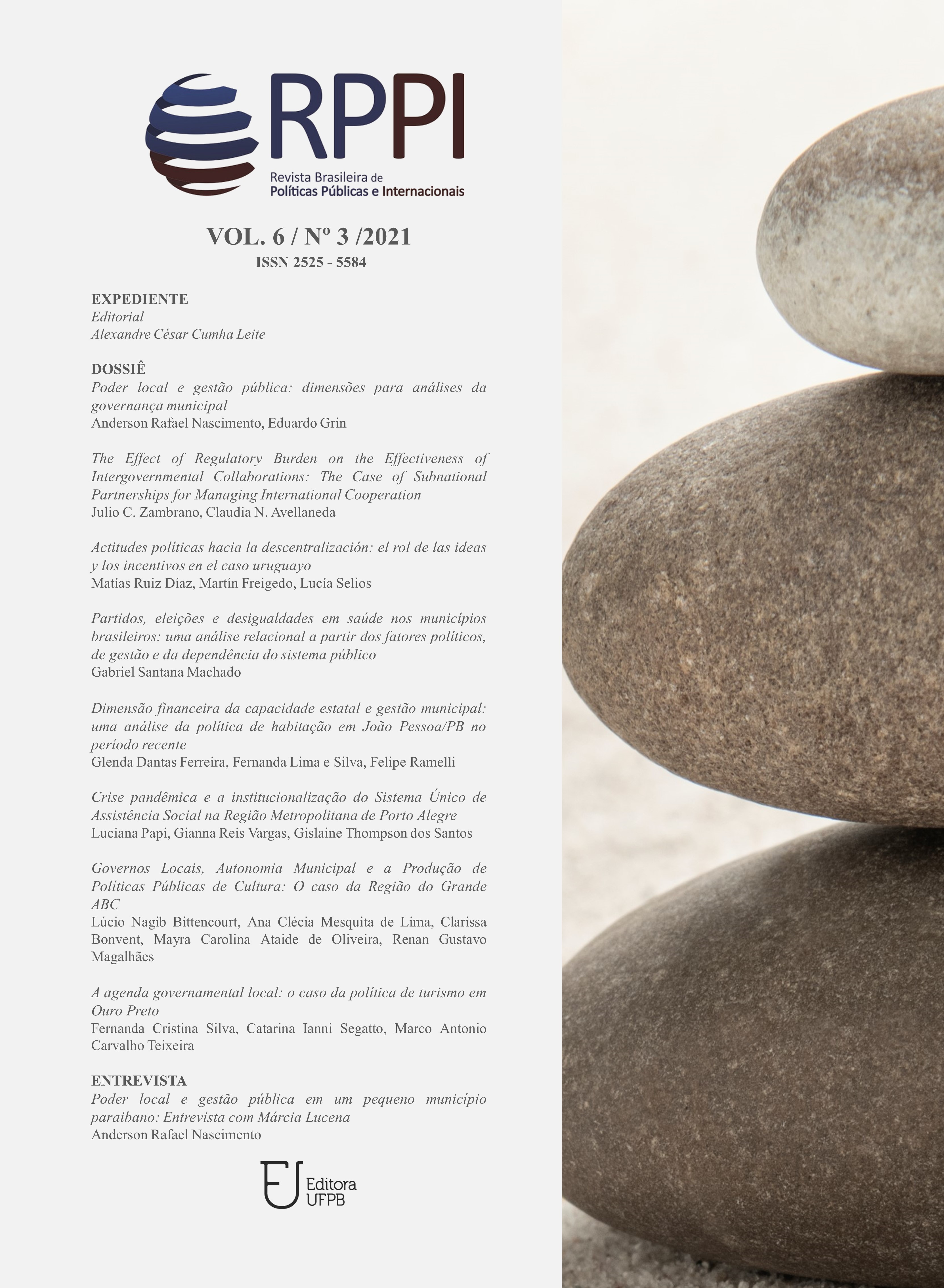Local power and public management
dimensions for analyzes of municipal governance
DOI:
https://doi.org/10.22478/ufpb.2525-5584.2021v6n3.62726Keywords:
Dossier, Local power, public managementAbstract
This dossier proposes the analysis of the relationship between local power and public management. Studies on local power have a long tradition in political thought, going back to authors such as Machiavelli, Tocqueville and Stuart Mill, sometimes emphasizing its role as a school of democracy, or else as a more efficient means of providing public services. The proximity between rulers and citizens was seen as fundamental for the constitution of political ties, a sense of collectivity and allocative efficiency.
The Brazilian case is emblematic for understanding these relationships, since the municipalities were raised to the level of a federative entity, therefore, with their autonomies preserved. The municipalist discourse was in tune with decentralization and democratization, which became key words in the new Constitution.
Local power always refers to the municipal sphere. However, this does not occur as a limit. The location is not restricted to municipalities. Whether because local power can be associated with intraterritorial dimensions that can be political subdivisions of the municipal space. Or because, the local power can cover more than one municipality, therefore, the local associated with the regional one.
The municipality, the understanding of its management and its public policies are challenging scenarios that make it possible to verify ways in which local power occurs and, mainly, what impacts they generate on local state capacities and on municipal governance. The question that arises is that those two virtuous effects, in the view of modern political theorists, generated by local power, may not occur synergistically and simultaneously, and public management is part of this context. In other words, greater democratization may not have an effect on the quality of public service provision, and vice versa.
In the Brazilian case, classical studies understood local power as efforts made by political actors for the preservation and predominance of their interests, which in general can be classified as private. In this context, local power can be seen as antagonistic to the notion of republican State if patrimonialist logics still persist in the functioning of local governments. These are issues that still impact Brazilian municipalities, especially micro and small ones, in which phenomena of oligarchization of power still exist, as is the case of families that succeed each other in command of local politics. This type of reality, if it does not prevent it, makes it more difficult to analyze them based on the references of urban policies that presuppose public debate and the participation of actors and processes that influence the production of policies in cities (Marques, 2018).
Public management presupposes impersonal methods and specific rationalities for the conduct of the State in search of efficiency. In the context of patrimonial relations whose local power emerged, public management was unable to follow its bureaucratic paths, coexisting with precariousness and discontinuity. Thus, relations of conflicts and disputes between local power and public management were established.
Local government gains evidence in these relationships, as it has the double challenge: (1) to create interfaces and connections between the porosity of local power, to be an executive representation of local political forces and (2) to promote the constancy that public management would presuppose, since the local government acts with defined purposes in a territorially delimited jurisdiction.
This text, as well as those presented in the Dossier, seeks to advance the challenge of delimiting the relationships between the concepts of local power and public management. As such, the theme of local government becomes a cross-cutting theme that seeks to stitch together the analyzes and concepts.
This text is organized into four sections, in addition to this introduction. The first part discusses the concept of local autonomy to understand central aspects related to politics. The second takes a brief look at local power in Brazil to understand historical and contemporary aspects of the concept. The third part presents a debate on the impacts that the relations between local power and public management generate on contemporary urban governance. Finally, the last part presents the texts that make up the Dossier.
Downloads
Additional Files
Published
Issue
Section
License
Copyright (c) 2022 Anderson Rafael Nascimento

This work is licensed under a Creative Commons Attribution 4.0 International License.
Autores que publicam nesta revista concordam com os seguintes termos:- Autores mantém os direitos autorais e concedem à revista o direito de primeira publicação, com o trabalho simultaneamente licenciado sob a Licença Creative Commons Attribution que permite o compartilhamento do trabalho com reconhecimento da autoria e publicação inicial nesta revista.
- Autores têm autorização para assumir contratos adicionais separadamente, para distribuição não-exclusiva da versão do trabalho publicada nesta revista (ex.: publicar em repositório institucional ou como capítulo de livro), com reconhecimento de autoria e publicação inicial nesta revista.
- Autores têm permissão e são estimulados a publicar e distribuir seu trabalho online (ex.: em repositórios institucionais ou na sua página pessoal) a qualquer ponto antes ou durante o processo editorial, já que isso pode gerar alterações produtivas, bem como aumentar o impacto e a citação do trabalho publicado (Veja O Efeito do Acesso Livre).




_.jpg)






.png)


.jpg)
_.png)
